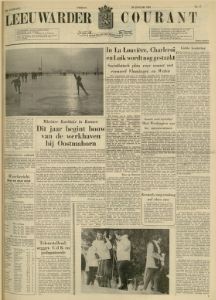About the day » Friday January 20, 1961Calender converter
January 21, 1961 
 January 19, 1961
January 19, 1961
Born on Friday January 20, 1961
- Roxanne Renae Gritters, Iowa, Verenigde Staten († 2009)
- Regina Margaretha van Schaik († 1997)
- Joseph ( Joey ) Rienks († 1964)
- Maria Anne (Marian) Rikkers, Perth, City of Perth, Western Australia, Australia
- Bernadette Marthe Céline Marie Renelde Ghislaine van DOORSLAER de ten RYEN, Grand-Manil, 5030, Namur, Belgique
- Doodgeboren kind van de Sande, 's-Hertogenbosch, Noord-Brabant, Nederland († 1961)
- Rob Wamelink, Noordwijk († 2006)
- Eric Robert Marc Nollet, Lille, 59 (F) († 2020)
- Astrid de La Cropte de Chantérac, Antananarivo, Madagascar († 1961)
- Rob WAMELINK, Noordwijk, Zuid-Holland, Nederland († 2006)
Died on Friday January 20, 1961
- Adrianus de Hommel (78), Schijndel
- Antonius Maximiliaan Jozef Hijman (88), Rotterdam, Zuid-Holland, Nederland
- Abramina van Vessem (79), Bruinisse
- Aukje Jans Bonsma (87), Baarderadeel, Friesland, Nederland
- *Egbert Stuut (88), Siddeburen Gem Slochteren
- Antje Engelkens (74), Veendam, Groningen, Nederland
- Anna Tonia Bemener (56), Delft, Zuid-Holland, Nederland
- Anna Maria Catharina de Fauwe (76), Weert,, Limburg, Nederland
- Aaltje Blom (63), Texel
- Albertus Jan Edens (71), Rotterdam, Zuid-Holland, Netherlands
Source: Delpher (KB | national library) Newspapers from January 20, 1961 at Delpher
- Nieuwsblad van het Noorden
- Friese koerier : onafhankelijk dagblad voor Friesland en aangrenzende gebieden
- Nieuw Guinea koerier : de groene : onafhankelijk dagblad voor Ned. Nieuw Guinea
- Gereformeerd gezinsblad / hoofdred. P. Jongeling
- Nieuw Israelietisch weekblad
- Het vrije volk : democratisch-socialistisch dagblad
- Nieuw Suriname : Surinaams nieuws- en advertentieblad
- De waarheid
- Leeuwarder courant : hoofdblad van Friesland
- De Tijd De Maasbode
Born on January 20
- 1958 » Lorenzo Lamas, American actor, director, and producer
- 1959 » R. A. Salvatore, American author
- 1959 » Tami Hoag, American author
- 1960 » Apa Sherpa, Nepalese-American mountaineer
- 1960 » Scott Thunes, American bass player
- 1960 » Will Wright, American video game designer, co-founded Maxis
- 1963 » James Denton, American actor
- 1963 » Mark Ryden, American painter and illustrator
- 1964 » Ozzie Guillén, Venezuelan-American baseball player and manager
- 1964 » Ron Harper, American basketball player and coach
Died on January 20
- 1947 » Josh Gibson, American baseball player (b. 1911)
- 1954 » Fred Root, English cricketer and umpire (b. 1890)
- 1954 » Warren Bardsley, Australian cricketer (b. 1882)
- 1955 » Robert P. T. Coffin, American author and poet (b. 1892)
- 1962 » Robinson Jeffers, American poet and philosopher (b. 1887)
- 1965 » Alan Freed, American radio host (b. 1922)
- 1971 » Broncho Billy Anderson, American actor, director, producer, and screenwriter (b. 1880)
- 1971 » Minanogawa Tōzō, Japanese sumo wrestler, the 34th Yokozuna (b. 1903)
- 1973 » Amílcar Cabral, Guinea Bissauan-Cape Verdian engineer and politician (b. 1924)
- 1973 » Lorenz Böhler, Austrian physician and surgeon (b. 1885)
Names that were popular for boys in 1961
Names that were popular for girls in 1961
Source: Wikipedia Historical events 1961
- Koningin Juliana (Huis van Oranje-Nassau) was from September 4, 1948 till April 30, 1980 sovereign of the Netherlands (also known as Koninkrijk der Nederlanden)
- In The Netherlands , there was from May 19, 1959 to July 24, 1964 the cabinet De Quay, with Prof. dr. J.E. de Quay (KVP) as prime minister.
- The Netherlands had about 11.6 million citizens.
- February 3 » The United States Air Forces begins Operation Looking Glass, and over the next 30 years, a "Doomsday Plane" is always in the air, with the capability of taking direct control of the United States' bombers and missiles in the event of the destruction of the SAC's command post.
- March 29 » The Twenty-third Amendment to the United States Constitution is ratified, allowing residents of Washington, D.C., to vote in presidential elections.
- April 27 » Sierra Leone is granted its independence from the United Kingdom, with Milton Margai as the first Prime Minister.
- May 25 » Apollo program: U.S. President John F. Kennedy announces, before a special joint session of the U.S. Congress, his goal to initiate a project to put a "man on the Moon" before the end of the decade.
- September 11 » Hurricane Carla strikes the Texas coast as a Category 4 hurricane, the second strongest storm ever to hit the state.
- September 16 » The United States National Hurricane Research Project drops eight cylinders of silver iodide into the eyewall of Hurricane Esther. Wind speed reduces by 10%, giving rise to Project Stormfury.
Weather January 20, 1961
The temperature on January 20, 1961 was between 0.3 °C and 3.4 °C and averaged 2.0 °C. There was 1.7 mm of rain during 2.2 hours. The heavily clouded was. The average windspeed was 3 Bft (moderate breeze) and was prevailing from the south-southeast.
